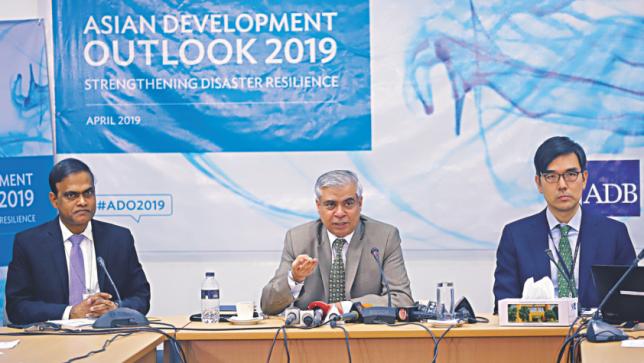Fastest in Asia-Pacific

Bangladesh is on track to log in the fastest economic growth in the Asia-Pacific region in fiscal 2019-20, said the Asian Development Bank in its latest report -- in a resounding endorsement of the government's economic policymaking.
The economy is expected to grow at 8 percent next fiscal year, which is the same as this year, said the Manila-based lender in the latest edition of its flagship publication, Asian Development Outlook 2019.
Earlier in September last year, the ADB had forecasted that the GDP growth in 2018-19 would be 7.5 percent.
But thanks to the robust private consumption, increased public investment, strong export performance and expansion in industries the ADB has revised upwards its growth forecast by 50 basis points.
The higher forecast though is less than the government's own forecast of 8.13 percent.
“Bangladesh's economy is in a good shape,” said Manmohan Parkash, country director of the ADB, at the unveiling of the report at its Dhaka office in Agargaon. The country's macroeconomic management remains generally sound. Inflation edged up slightly to 5.8 percent but remained in check.
Although budget revenue underperformed its target, the fiscal deficit was well within the budgetary target.
The current account deficit widened due to the surge in import demand, but it was mainly from the increase in imports of intermediate and capital goods, which will boost short- to medium-term production, Parkash said.
Continued favourable trade prospects, stronger performance of exports and remittances and heightened public investment for expeditious implementation of large infrastructure projects account for the multilateral lender's sanguinity on the Bangladesh economy in the near term.
“Bangladesh's economic outlook remains optimistic in the short-run. But to sustain this momentum in the medium- to long-term, there are several challenges we need to overcome,” Parkash said.
The country needs expanded industrial base, diversified export basket, improved business environment for vibrant private sector development, expanded tax base, better revenue collection for increased resource allocation and human capital development.
“Continued focus on prudent macroeconomic policies, sound debt management, strengthening the banking sector, removing infrastructure constraints and reducing the cost of doing business are important to help achieve the long-term development vision of the country,” Parkash added.
Soon Chan Hong, senior economist at the ADB, expressed concerns about the state of the banking sector.
The high non-performing loan ratio, low profitability, weak governance, widening capital shortfall, operational inefficiency and ineffective legal framework are worrying, he said.
